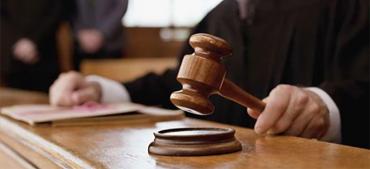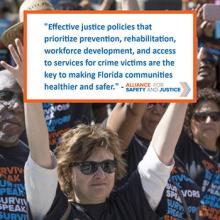
With the House vote Friday, the Florida Legislature has passed its most expansive justice reform bill in 20 years, an initiative led by the state's crime surivors, many of whom rallied in Tallahassee this session to call for change.
Robert Rooks, vice president of the Alliance for Safety and Justice, said of HB 7125, what makes the legislation so "exciting" is that "major provisions of the package were championed by Florida crime survivors from across the state in their #SurvivorsSpeak Justice Reform Agenda.”
Thousands of Floridians are incarcerated, not because they have committed a new offense, but because of a technical violation of probation (missing a class or meeting, not reporting a change in employment, or change in address), said Rooks. This legislation would encourage a more effective approach proven to better hold people accountable and ensure they successfully re-enter society: judges using graduated sanctions rather than expensive prison time for a technical violation of probation.

Debbie Ortiz, a Crime Survivors for Safety and Justice member from Spring Hill, said, “This year, over 300 crime survivors from across the Sunshine State traveled to Florida’s Capitol to advocate for policy changes and worked with lawmakers all session. This is the first time criminal justice reforms, which both reduce incarceration and improve safety, were advanced in partnership with crime victims, representing a turning tide.”
At least 47 other states have a higher threshold for felony theft, higher than Florida’s $300 amount, including Alabama, Georgia, Mississippi and South Carolina. Florida’s threshold hasn’t changed since 1986 and fails to reflect current costs and dollar values. This legislation would modernize Florida’s threshold, ensuring people are held accountable without the excessive use of felony convictions, which carries destabilizing barriers. The new threshold would be increased to $750.
Through changes targeting how the state responds to low-level violations of probation rules, low-level property crimes, and numerous other provisions, HB 7125 will result in hundreds, if not thousands, fewer people sitting in Florida’s overburdened prison system for these low-level, non-violent crimes and rule violations.
-
Last year, over 6,000 technical violators were sentenced to prison -- even a modest reduction to this number would mean hundreds if not thousands fewer people in prison for technical violations of supervision.
-
Last year, over 10,000 people were convicted of a low-level property crime and saddled with a felony record, thousands of whom will now face misdemeanor charges instead. Over 1,000 people were sentenced to prison for low-level property crimes, hundreds of whom would be impacted by this bill.
-
Hundreds of Floridians could be diverted from prison due to the end of mandatory direct file of youth into the adult legal system, expanded access to alternative and diversion programs, reforms to certain mandatory minimum sentences, and fewer returns to prison from improved reentry and reduced recidivism.
And, stats from the Alliance for Safety and Justice show Floridians living with a past conviction face over 500 legal restrictions that prevent them from contributing to their families, communities and the economy. A past conviction can restrict people from receiving state-issued occupational licenses, blocking them from employment that could help them achieve self-sufficiency and successfully re-enter society. A number of jobs require such licenses, including fields like barbering, cosmetology and construction, among many others. This legislation moves Florida closer to a system where a past conviction can no longer prevent Floridians from earning a job and achieving economic stability.
By providing pathways to earn redemption, we ensure people become contributing members of their families and communities rather than remaining in a cycle of crime. Removing obstacles for people to work can reduce recidivism and create safer communities.
Crime survivors face serious barriers to getting help after becoming a victim of crime -- many get no help at all. This legislation changes all that.
The Alliance for Safety and Justice, whose Florida members provided the impetus for HB 7125, is a national organization that aims to win new safety priorities in states across the country.


